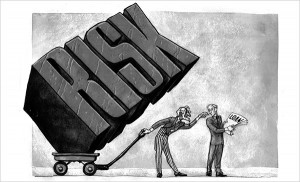 I frequently disagree with Tyler Cowen — our world economic views are quite different, as are, I assume, our politics. But his column in the Sunday Times today, I can find at least one major area where we are sympatico:
I frequently disagree with Tyler Cowen — our world economic views are quite different, as are, I assume, our politics. But his column in the Sunday Times today, I can find at least one major area where we are sympatico:
“But there is a big hole in these proposals, as there has already been in the government’s approach to bailing out failing financial companies. Even as they focus on firms deemed too big to fail, the new proposals immunize the creditors and counterparties of such firms by protecting them from their own lending and trading mistakes.
This pattern has been evident for months, with the government aiding creditors and counterparties every step of the way. Yet this has not been explained openly to the American public.
In truth, it’s not the shareholders of the American International Group who benefited most from its bailout; they were mostly wiped out. The great beneficiaries have been the creditors and counterparties at the other end of A.I.G.’s derivatives deals — firms like Goldman Sachs, Merrill Lynch, Deutsche Bank, Société Générale, Barclays and UBS.
These firms engaged in deals that A.I.G. could not make good on. The bailout, and the regulatory regime outlined by Timothy F. Geithner, the Treasury secretary, would give firms like these every incentive to make similar deals down the road.
That is a huge flaw in the Paulson plan, now adopted by Geithner.
Tyler’s suggestion? Worry less about executive pay, and more creditor bailouts:
“Restricting compensation at these creditor firms would have more force — if it is done transparently, in advance and in accordance with the rule of law. A simple rule would be that some percentage of bailout funds should be extracted from the bonuses of executives on the credit or counterparty side of transactions.”
Interesting stuff. As to the disagreements:
• “A simple but unworkable alternative is to let major creditors make their claims in the bankruptcy courts”
I totally disagree; That’s what bankruptcy courts are for. Anything else replaces the capitalist system with the worst form of Moral Hazard — a direct guarantee of all credit.
• “This suggests a scary possibility — that the next regulatory regime could end up even worse than the last.”
Um, what regulation? Half of the current problems derive from an absence of any prior regulatory regime. No derivative regulation, no limits on leverage, no separation of commercial and investing banking.
• “Much went awry at A.I.G., but in the context of a bailout, the company should be thought of as the conduit for helping an entire market that went bust.”
No, it shouldn’t. If we say that, then the Taxpayer is implicitly guaranteeing all credit and speculation.
One last thing: Obama administration rightly deserves criticism for this policy — but nowhere in Cowen’s article does he mention that this absurd policy is a continuation of the stupidity put forth by Hank Paulson, the Treasury Secretary under George W. Bush. That is a very unfortunate oversight in an otherwise good article.
Change we can believe in? Hardly.
>
Previously:
Haircuts for Bond Holders (March 11th, 2009)
http://www.ritholtz.com/blog/2009/03/haircuts-for-bond-holders/
Solvent Insurer / Insolvent Insurer (March 4th, 2009)
http://www.ritholtz.com/blog/2009/03/solvent-insurer-insolvent-insurer/
Source:
Why Creditors Should Suffer, Too
TYLER COWEN
NYT, April 4, 2009
http://www.nytimes.com/2009/04/05/business/economy/05view.html


What's been said:
Discussions found on the web: